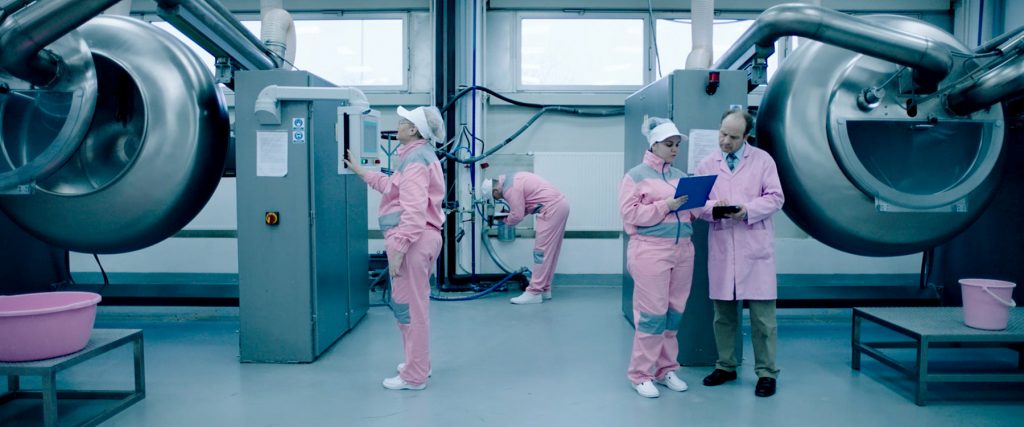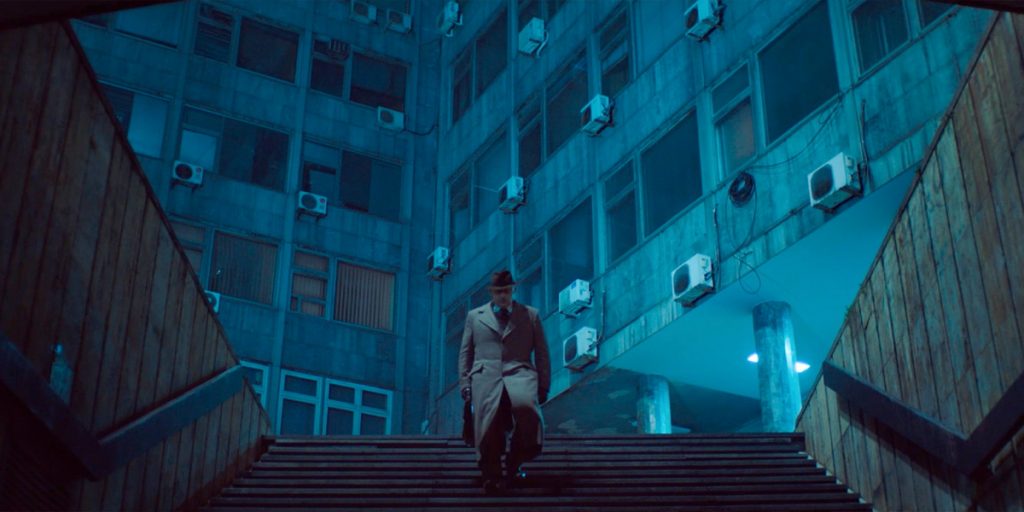Undergods evokes an arresting dystopian atmosphere with compelling cinematic vision but leaves a sour taste in the mouth with its bleak and hollow storytelling.
“Of all this, everything will be soaked into a massive hole and then, all will be fog,” says an ominous voice as a tall, slender figure aimlessly wanders through a desolate, foggy landscape. A rundown truck drives nearby, introducing our narrators K (Johann Myers) and Z (Géza Röhrig), two grisly, gasoline guzzling workers scavenging the area for bodies. It’s a grim opening, perfectly setting the stage for the hellish descent into the dystopian nightmares to come in Chino Moya’s feature debut Undergods.
It’s difficult to describe Undergods’ story and how the narrative functions—imagine something like a Russian nesting doll of stories, each one a layer inside the other, yet they overlap and bleed into each other, as if entering through some torn cosmic fabric. After the opening set in a harsh, apocalyptic landscape of crumbling tower blocks and ominous fog, we enter new nightmares of a neighbor who takes over a couple’s marriage in an empty high rise, a duplicitous businessman who steal’s an inventor’s idea, and a woman’s first husband who suddenly returns home after fifteen years.
While each story takes place in distinct settings, similar thematic patterns emerge between them: middle class malaise, sexual jealousy, stealing, punishment, and mundane encounters with cruel, malevolent supernatural forces. Moya’s narrative experiment ultimately works best because it never bothers explaining itself, and since each story hints at some otherworldly element, the sense of mystery and weirdness throughout keep us intrigued, even if it’s often difficult to make much sense of what we’re witnessing onscreen.
At times reminiscent of the off-kilter sense of reality of Black Mirror and the sinister mood of Peter Strickland’s films like In Fabric, Undergods crafts a chilling, pervasive atmosphere that grabs ahold of you and never lets go until the end credits roll. Moya boasts remarkable visual sensibilities as a director, cleverly concocting despairing dystopias out of mundane, modern settings. Undergods is a visually oppressive film, often populated with bleak blues and grim greys that build a sickly, toxic color palette.

Meanwhile, the film’s frequent images of brutalist architecture create a sense of scale just as much as a sense of claustrophobic dread, especially the wide shots of Soviet-era tower blocks and massive concrete structures in the decaying landscape. Even the less oppressive spaces, like highways and suburbs, feel like their own dystopias—anonymous, alienating—with the same kind of disaffection with the modern world right out of a J. G. Ballard novel. There’s no clear setting to this film—it feels both futuristic and historic, imagining ambiguous apocalyptic landscapes to come while also evoking images of twentieth century totalitarian regimes, creating a timelessness and placelessness that ensures a dreamlike dimension—vaguely familiar yet uncanny, and existing entirely in its own twisted reality.
Ultimately, Undergods is most successful as a mood piece, best experienced in total surrender to its images and atmosphere where its storytelling falters and feels hollow. It’s a relentlessly bleak and nihilistic film, with no moments of catharsis and respite, and its instances of humor are dark, dry, and painfully awkward. There’s nowhere to emotionally enter, engage, and exit the film, and it’s easy to feel just as isolated, disturbed, and confused as the characters within their stories. While Undergods operates on a unique narrative experiment, it offers unsatisfying storytelling that grants conclusions to stories but no proper resolution, and given little exposition, it’s difficult to properly follow these stories until we can make enough sense of them from what we see.
Its greatest point of disconnection is clearly in its characters—cruel, morally ambiguous, detached individuals trying to survive in harsh, unforgiving worlds intent on punishing and destroying them. There’s no one in the film that we can latch onto, no one to help guide us through their journey, no one to feel for, and instead we are just helpless observers witnessing their sins, transgressions, suffering, and punishments.
Looking at Undergods as a whole, it seems to be that there’s something missing—a context, a purpose, a point—anything to grasp onto, but it’s difficult to discern what exactly that is, and in the end, this seems to function best as a harsh, miserable cinematic nightmare you desperately want to end, but can’t quite look away from.
Undergods premiered at the Glasgow Film Festival on 26th February, 2021 and was released theatrically and on digital on May 7th in the US, and on May 17th in the UK.

